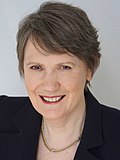Peter Davis | |
|---|---|
 Davis in 2010 | |
| Spouse of the Prime Minister of New Zealand | |
| In role 10 December 1999 –19 November 2008 | |
| Prime Minister | Helen Clark |
| Preceded by | Burton Shipley |
| Succeeded by | Bronagh Key |
| Personal details | |
| Born | Peter Byard Davis 25 April 1947 Milford on Sea,Hampshire,England |
| Nationality | New Zealander |
| Party | Labour |
| Spouse | |
| Academic background | |
| Alma mater | University of Southampton (BA) London School of Economics (MSc) University of Auckland (PhD) |
| Thesis | A sociological analysis of the relationship between the formal and informal sectors of dental care in New Zealand (1984) |
| Academic work | |
| Discipline | Sociology |
| Institutions | University of Canterbury University of Otago University of Auckland |
| Website | University website |
Peter Byard Davis (born 25 April 1947) is a New Zealand sociologist,professor,and the husband of Helen Clark,who was the Prime Minister of New Zealand from 1999 to 2008.
